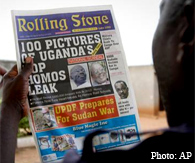The Ugandan high court has ruled that the story in the Rolling Stone newspaper, which printed addresses and photographs of some of the 100 people it named as "Uganda's top homos", violated their constitutional rights to privacy and safety.
The court awarded the three plaintiffs in whose names the case was launched US$650 each in damages, the UK Guardian quoted the Civil Society Coalition on Human Rights and Constitutional Law in Uganda, which had filed the complaint against the newspaper on behalf of three members, as saying.
The ruling was made three months after the local tabloid (no relation to the US magazine) published a list of people it said were gay and alongside a yellow banner reading "hang them". It also urged readers to report them to police. Media reports say at least four people were attacked because of the article and at least one woman named in the story had been forced to leave her home after neighbours pelted it with stones.
Homosexual acts are already illegal, but the proposed Anti-Homosexuality Bill proposes new offences and urges the toughening of existing penalties including the death penalty for HIV-positive people convicted of having gay sex and life imprisonment for anyone else convicted of having gay sex.
Afrik News reported on Jan 3, 2010:
Gays in Uganda celebrated today, after courts ruled in their favor in a case against a newspaper which called on people to hang them.

In October 2010, Rolling Stone newspaper had boldly called for gays to be hanged in one of their headlines. "Hang Them," the headline read. The ensuing story showed photos of people presumed to be gays in Uganda, and even indicated locations of their homes.
And according to gays in Uganda, the newspaper article led to some of those whose photos, names and home adresses appeared in the newspaper to be attacked and beaten up by people who claimed to be anti-gay.
But after taking the case to court and applying for damages whilst requesting for an injunction against the newspaper, a Uganda court Monday ruled in favor of the plaintiffs.
The court has also issued a permanent injunction against Rolling Stone newspaper never to publish photos of gays in Uganda, and also never to again publish their home addresses.
Justice Kibuuka Musoke’s ruling read in parts: "Gays are also entitled to their rights. This court has found that there was infringment of some people’s confidential rights. The court hereby issues an injuction restraining Rolling Stone newspaper from future publishing of identifcations of homosexuals."
Sexual Minorities Uganda (SMUG) program coordinator Pepe Julian Onziema told the press after the ruling that they are happy because the court had ruled in their favor.
A man who identified himself as gay, Balae Ogole, said gay people "can now trust our courts because they have come up with a very appropriate judgment."
Meanwhile, pro-gay groups are organizing parties in different parts of the country to celebrate the court decision, which they claim lays a solid foundation for human rights.
Meanwhile in India, the Times of India – the world's largest selling English-language daily newspaper – which is known to be gay-friendly in its coverage of LGBT-related news surprised some local LGBT activists by including the details such as the occupations, college or place of employment of some of the 13 men arrested on charges of obscenity at a public place. The report said men were arrested after police raided a birthday bash attended by over 100 people including doctors, lecturers, and social activists over the Christmas weekend in Saharanpur in the state of Uttar Pradesh in northern India. The report also named the organiser of the party and the business he runs.











 Printable Version
Printable Version










Reader's Comments
Perhaps the saddest and most ironic thing about the situation in Uganda is that the people showing the most hatred towards us GLBT people is that they claim that their stance is based in African culture, when in fact it is all borrowed from their European colonists! Even the language they speak is not their own.
Uganda has a sad history of using minorities as scapegoats, vicious persecution of dissenters and in-fighting, on the other hand the country has shown great unity and honesty in dealing with the HIV/AIDS epidemic which has caused such devestation in other parts of Africa.
Let's hope that the latter quality prevails.
There is a good reason that the era in which religion effectively ruled the world is called the "Dark Ages." Religion does a bit of good, I think, and I'd never say it's entirely evil, but I think overall it's a scourge, and a serious impediment to social development and human aspirations. I can only hope that there is a time ahead where all people can TRULY live in reasonable peace. It may well take another 5,000 years though.
the gahment secretly.... some how... some parts of the
Gahment ppl, lawmakers , see it as a threat to the
future gahment - tax collections, birth rate, labour...
Last, the IDIOTIC religious belief that God is anti Gay
Please log in to use this feature.